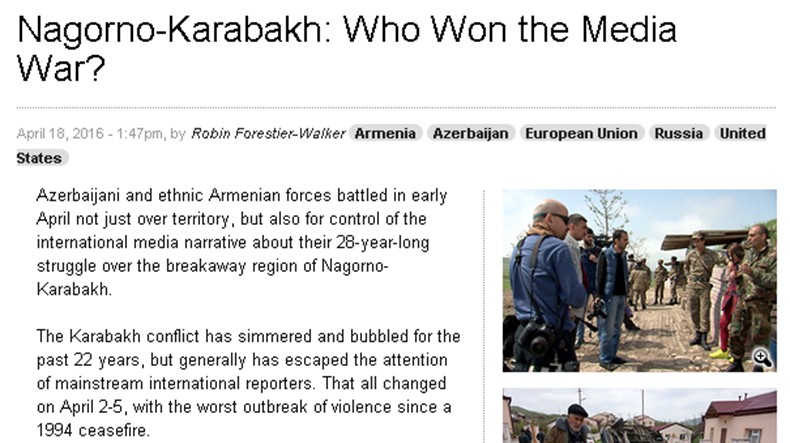
EurasiaNet: Who won the media war over Nagorno Karabakh?
Azerbaijani and ethnic Armenian forces battled in early April not just over territory, but also for control of the international media narrative about their 28-year-long struggle over the breakaway region of Nagorno-Karabakh, writes EurasiaNet.org.
The ability of journalists to cover the conflict varied markedly.
According to the source, many foreign journalists were able to enter Karabakh via Armenia unhindered and quickly obtain accreditation upon arrival in the main city, Stepanakert. Local de facto officials held daily press briefings, including question and answer sessions, at a central hotel. Armenia’s public television station offered free satellite link-ups and journalists were able to travel independently in civilian vehicles outside the frontline areas.
On the other side of the divide, journalists found it tougher going. Azerbaijan maintains a strict policy of controlling media access, especially to areas close to the frontlines. It also has a history of denying visas to journalists who previously have travelled without Baku’s consent to Karabakh. Security officials in Azerbaijan’s Goranboy region held and questioned a television crew from Georgia’s Rustavi2 for several hours because they did not have accreditation. After intervention by Georgian and Azerbaijani diplomats, the crew was able to continue reporting. A group from Russia’s LifeNews channel, an outlet with allegedly close ties to the Russian security services, was not so fortunate. The crew was expelled for lack of accreditation and allegedly spreading claims, also featured in Armenian media, that Azerbaijan was using Islamic State terrorists against Armenian and Karabakhi forces.
While separatist Karabakh and Armenia may have been better positioned to feed the international media cycle, Azerbaijan was not without resources.
According to the source, three days after the April 5 ceasefire was announced, Azerbaijan agreed to pay its chief American PR consultants, the high-end, Washington, DC-based Podesta Group, an additional $70,000 for three months’ worth of “public affairs services,” according to papers filed with the US Department of Justice.
Since January, the Podesta Group has held a six-month-long, $300,000-plus-expenses lobbying contract with Azerbaijan.
Armenia does not have registered US lobbyists. Much of the push for its views on Karabakh comes via influential Diaspora organizations.
It remains to be seen whether the latest bout of fighting has raised international awareness about the unresolved Karabakh conflict.
Newsfeed
Videos






























